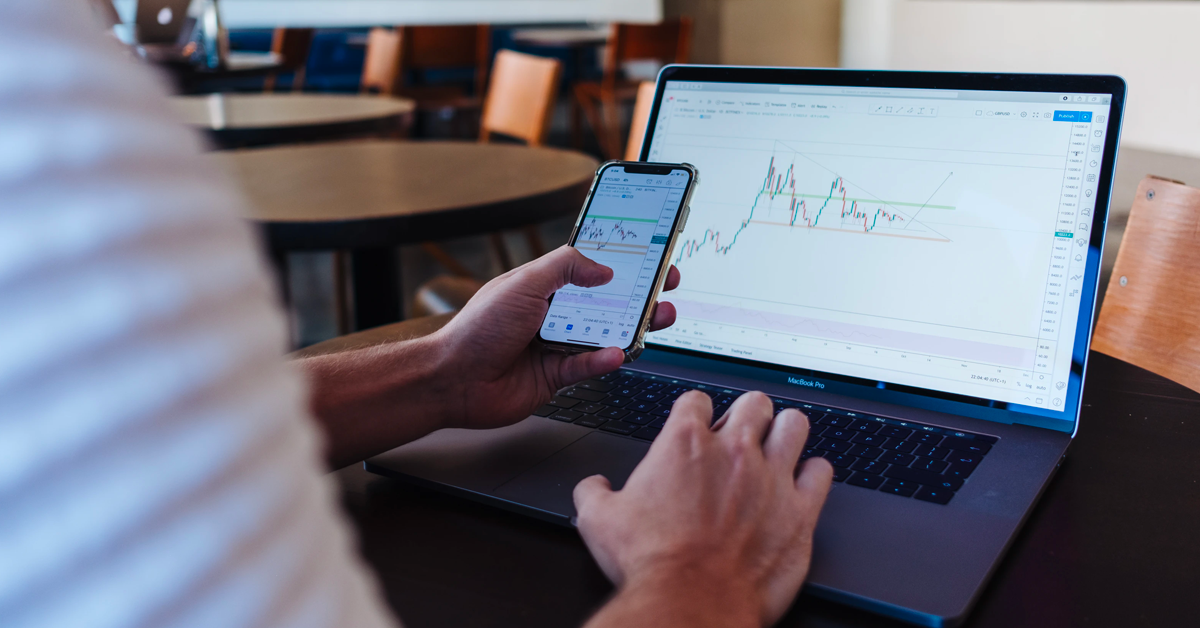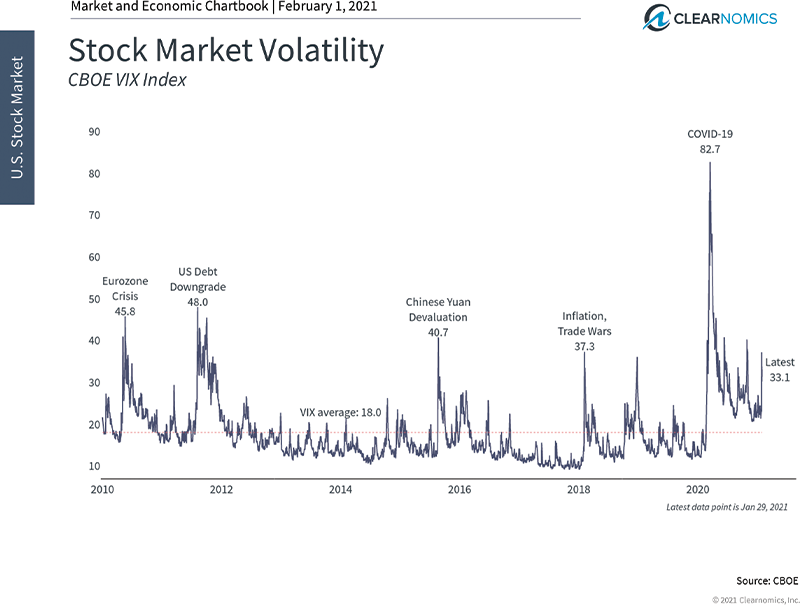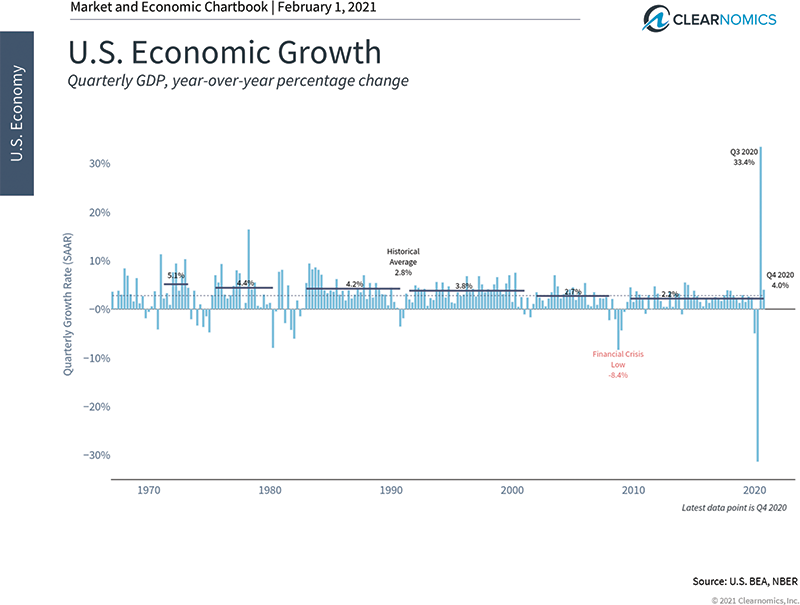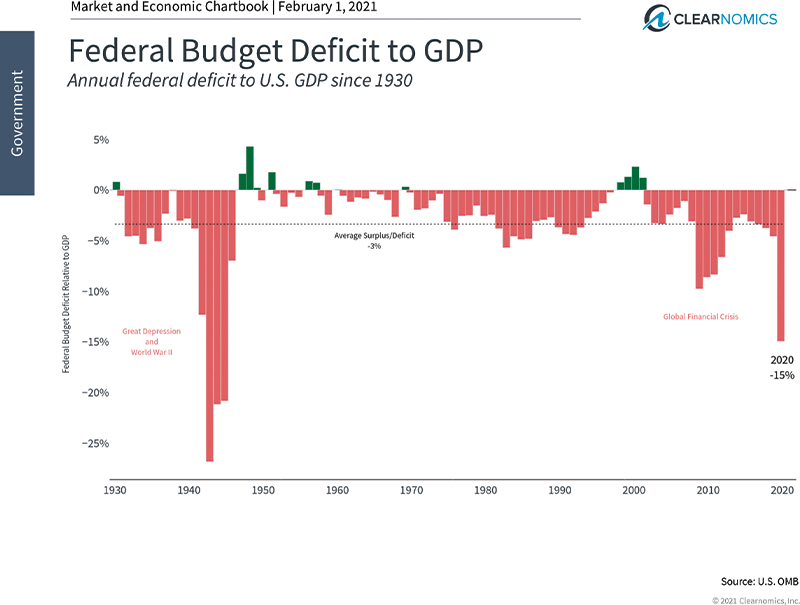by James Liu, CFA, Founder and Head of Research at Clearnomics (james@clearnomics.com; Copyright © 2021 Clearnomics, All rights reserved).

What captures the attention of investors, the media and the general public is often not what matters for portfolios, saving for retirement or achieving financial security. In the short run, events that involve individual stocks and market dislocations can be more interesting and seemingly more impactful than slow-moving economic progress. After all, flash crashes, short squeezes, bankruptcies, accounting fraud, personal scandals and other headlines are naturally eye-catching. Whether the economy grew by 4% or 4.2%, much less so. And yet, it is this slow smoldering growth, not a flash in the pan, that truly allows everyday investors to achieve financial freedom.
In part, this is because there are many different types of investors with distinct goals, all co-existing on the same field. For some, the stock market can be akin to a form of entertainment, not much different than a casino. Even when their intention is to trade profitably, invest seriously and achieve financial independence, their approach depends on luck and constant activity. Just as every lottery has winners, a few may even be successful.
In contrast, nearly a century of research and experience have shown that taking a disciplined, long-term portfolio approach is the prudent approach for investors to achieve their financial goals. Doing so is usually neither flashy, fun nor fast. It requires enduring difficult periods of market stress and resisting the natural urge to react to every new development. But, over time, doing so allows compounding to take effect and savings to grow without the need to constantly find the next hot stock tip. This is not to say that opportunities across individual stocks and sectors don't matter - they certainly do. However, they should be viewed from a portfolio perspective rather than as one-off bets.
Recent headlines involving short squeezes in specific stocks are perhaps the perfect storm of attention-grabbing events. However, the fact that "retail investors" form a very large and important constituency is not a new phenomenon. Nor is it new for investors - both retail and institutional - to follow the herd, whether led by newsletters, sell-side research, famous stock pickers, TV personalities, targeted content via social media tracking, or, in this case, an online forum. Short squeezes are also part and parcel with normal market behavior, even if it does mostly affect hedge funds and other institutional asset managers. What is unusual is that the size of the short squeezes and the dialed-up anti-establishment language helped to magnify the attention on this activity.
What was lost in late January’s market coverage was much less exciting but easily more important to long-term investors. First, the latest GDP report showed that the final quarter of 2020 grew at a pace of 4% and, overall, the economy shrank by 3.5% last year. While this is negative, it is far better than many had expected at the onset of the pandemic when there were fears of a second Great Depression. At the moment, economists forecast that GDP could return to pre-pandemic levels around the end of 2021. This is the biggest driver of the stock market's steep recovery over the past nine months.
Second, the Fed made no changes to policy and emphasized that it will keep interest rates low for the foreseeable future. At his press conference, Chair Powell emphasized that this will likely be the case even if inflation rises as the economy rebounds. Additionally, the Fed will continue to expand its balance sheet at a pace that will add $1 trillion every 8 to 9 months. For those worried about a sudden change in policy, Chair Powell emphasized that many lessons were learned during the previous "tapering" of asset purchases on how to properly communicate it well in advance. In the meantime, central bank policies around the world will likely continue to support the economy and financial markets.
Finally, the latest economic numbers mean that the deficit increased to 15% of GDP in 2020, three times its level the year before. This is the largest deficit level since World War II and surpasses the response to the 2008 financial crisis. However, it's also well understood by investors that this is due to pandemic stimulus spending in order to avert an even worse crisis. Although most would prefer surpluses to deficits, the question isn't whether the deficit is large - it's whether it will shrink once the pandemic is controlled. History shows that although government spending spikes during times of crisis, it usually then moderates once the economy is back on track.
For everyday investors, it's important to focus on the light at the end of the tunnel as vaccines are distributed and the economy continues to recover. Although recent headlines are eye-catching and could have some implications for market dynamics, they are not the primary driver of investor returns. Below are three charts that provide perspective on recent events and economic data.
1. Volatility has picked up due to short squeezes and herd behavior
Stock Market Volatility:

Stock market volatility increased in late January due to extraordinary activity in a few specific stocks. This raised fears that this behavior could spread to other investments. While this is certainly possible, history has shown that investors who can maintain discipline and diversification are better off staying invested.
2. The U.S. economy shrank in 2020 but is on track to recover
U.S. Economic Growth:

U.S. GDP decelerated last quarter after an initial bounce-back once businesses reopened from lockdown. Although the overall economy shrank in 2020, this was widely anticipated. It is still expected that the economy can return to pre-pandemic levels in the coming quarters as COVID-19 is controlled, vaccines are distributed and businesses can slowly return to normal operations.
3. The federal deficit expanded to 15% of GDP due to the pandemic
Federal Budget Deficit to GDP:

Pandemic spending and a shrinking economy resulted in a federal deficit of 15% of GDP. Although this is the worst level since World War II, it is a direct result of stimulus spending through legislation such as the CARES Act. Historically, deficit spending falls once the economy begins to recover.
The bottom line? Investors should continue to focus on long-term trends rather than day-to-day headlines, no matter how attention-grabbing they may be.
The information contained herein has been obtained from sources believed to be reliable, but is not necessarily complete and its accuracy cannot be guaranteed. No representation or warranty, express or implied, is made as to the fairness, accuracy, completeness, or correctness of the information and opinions contained herein. The views and the other information provided are subject to change without notice. All reports posted on or via www.clearnomics.com or any affiliated websites, applications, or services are issued without regard to the specific investment objectives, financial situation, or particular needs of any specific recipient and are not to be construed as a solicitation or an offer to buy or sell any securities or related financial instruments. Past performance is not necessarily a guide to future results. Company fundamentals and earnings may be mentioned occasionally, but should not be construed as a recommendation to buy, sell, or hold the company’s stock. Predictions, forecasts, and estimates for any and all markets should not be construed as recommendations to buy, sell, or hold any security--including mutual funds, futures contracts, and exchange traded funds, or any similar instruments. The text, images, and other materials contained or displayed in this report are proprietary to Clearnomics, Inc. and constitute valuable intellectual property. All unauthorized reproduction or other use of material from Clearnomics, Inc. shall be deemed willful infringement(s) of this copyright and other proprietary and intellectual property rights, including but not limited to, rights of privacy. Clearnomics, Inc. expressly reserves all rights in connection with its intellectual property, including without limitation the right to block the transfer of its products and services and/or to track usage thereof, through electronic tracking technology, and all other lawful means, now known or hereafter devised. Clearnomics, Inc. reserves the right, without further notice, to pursue to the fullest extent allowed by the law any and all criminal and civil remedies for the violation of its rights.







.png?width=300&height=300&name=Untitled%20design%20(34).png)







.png?width=300&height=300&name=Untitled%20design%20(43).png)

